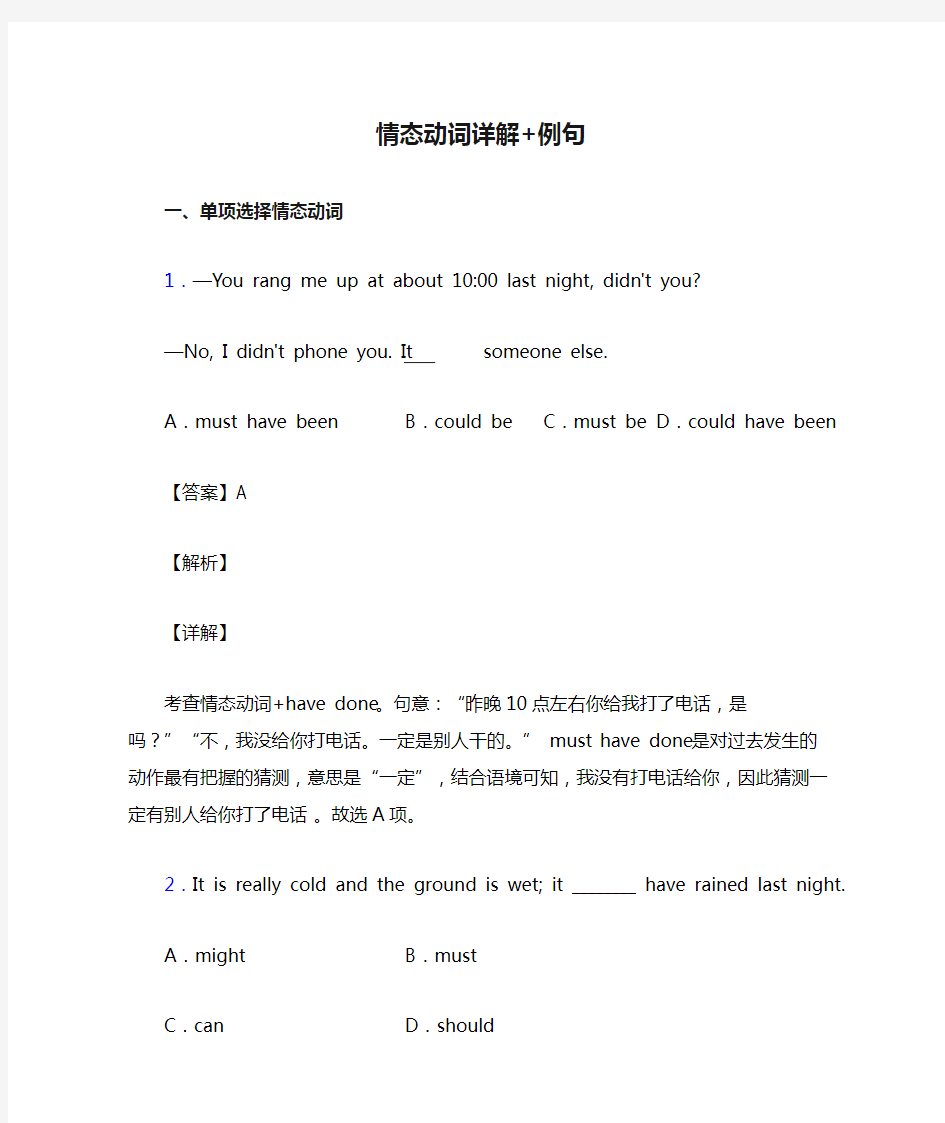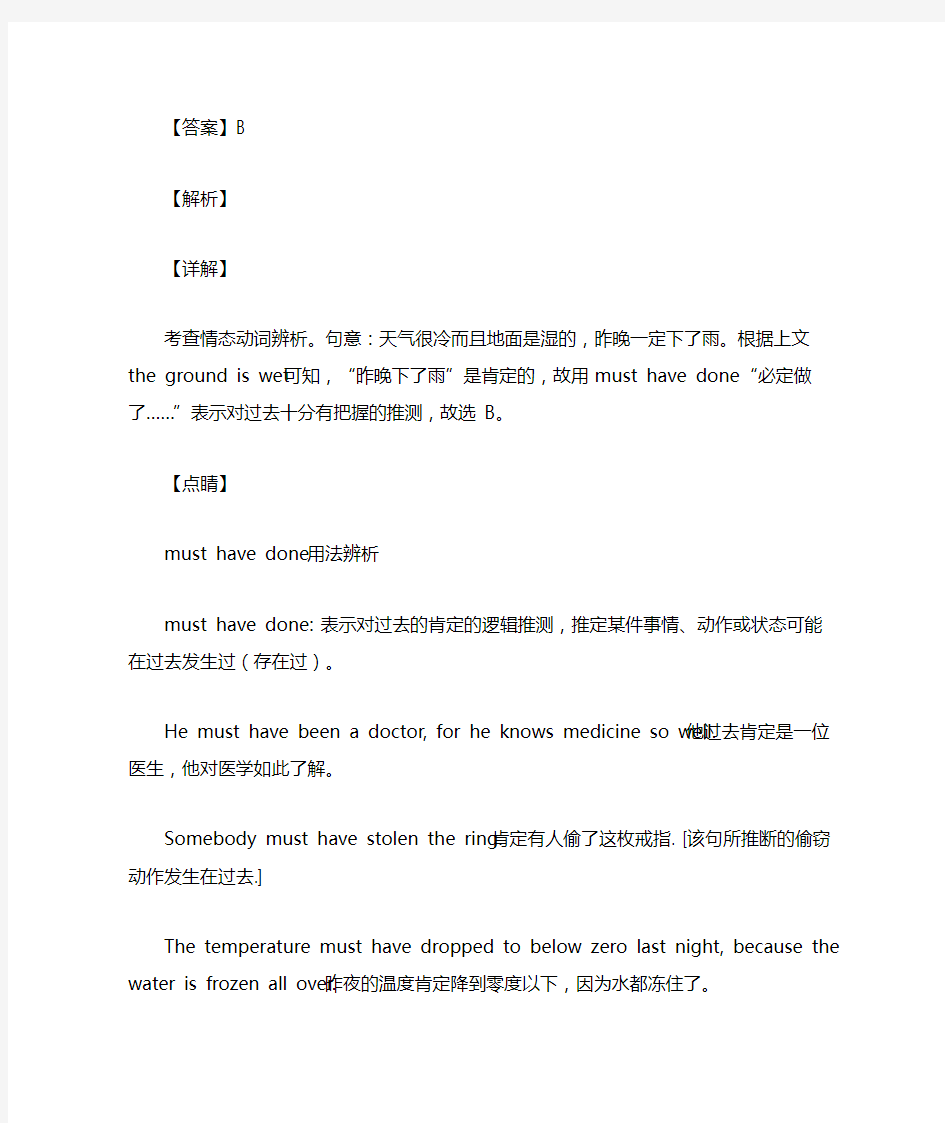情态动词详解+例句


情态动词详解+例句
一、单项选择情态动词
1.—You rang me up at about 10:00 last night, didn't you?
—No, I didn't phone you. It someone else.
A.must have been B.could be C.must be D.could have been 【答案】A
【解析】
【详解】
考查情态动词+have done。句意:“昨晚10点左右你给我打了电话,是吗?”“不,我没给你打电话。一定是别人干的。” must have done 是对过去发生的动作最有把握的猜测,意思是“一定”,结合语境可知,我没有打电话给你,因此猜测一定有别人给你打了电话。故选A 项。
2.It is really cold and the ground is wet; it ________ have rained last night.
A.might B.must
C.can D.should
【答案】B
【解析】
【详解】
考查情态动词辨析。句意:天气很冷而且地面是湿的,昨晚一定下了雨。根据上文the ground is wet可知,“昨晚下了雨”是肯定的,故用must have done“必定做了……”表示对过
去十分有把握的推测,故选B。
【点睛】
must have done用法辨析
must have done:表示对过去的肯定的逻辑推测,推定某件事情、动作或状态可能在过去发生过(存在过)。
He must have been a doctor, for he knows medicine so well. 他过去肯定是一位医生,他对医学如此了解。
Somebody must have stolen the ring. 肯定有人偷了这枚戒指. [该句所推断的偷窃动作发生在过去.]
The temperature must have dropped to below zero last night, because the water is frozen all over.昨夜的温度肯定降到零度以下,因为水都冻住了。
如果“must + have + 过去分词”句型与by now连用,还可以表示对现在完成的动作和状态的肯定推测,但实质上还是指所推测的过去的动作。例如:
They started early this morning; they must have arrived by now. 他们今晨很早就出发了,现在肯定已经到了。
中国学生的常见病句是:They...; they certainly have arrived.病句的句义是“他们当然已经到
达了。”(这不是对过去的肯定推测,而是断定动作已经完成。)
3.The room is so clean. He ________ have cleaned it yesterday evening.
A.will B.need
C.can D.must
【答案】D
【解析】
【详解】
考查情态动词表推测。句意:房间如此干净,他一定是昨天晚上打扫过了。must have done 表示对过去发生的事情有把握的猜测,意思是“一定(做过)”,故D项正确。
4.— Excuse me, do you mind if I open the window?
— Well, if you __________. I can put on more clothes.
A.can B.may
C.must D.shall
【答案】C
【解析】
【详解】
考查情态动词。句意:-不好意思,我把窗户打开你介意吗?- 好吧,如果你必须这么做的话。我可以多穿点衣服。A. can能够;B. may可能;C. must一定;必须;D. shall会;将。must表示偏要,必须要做的事情,故选C。
5.— Mum, little Ray broke his toys again!
—It doesn't matter. You see, accidents _____happen.
A.shall B.should C.must D.will
【答案】D
【解析】
【详解】
考查情态动词辨析。句意:——妈妈,小雷又弄坏了他的玩具。——没事的,你看,意外总会发生。A. shall将要,会;B. should应当;C. must必须;D. will总是。Will可以表示习惯,意思为“惯于,总是”。故D选项正确。
【点睛】
will/would是情态动词,其表达的意思如下。
(1)表示意志或意愿:决心,愿意,……好吗?
We will do our best to save the child. 我们会尽力抢救这个孩子。
I told her to stop crying, but she just w ouldn’t listen. 我叫她别哭,可她就是不愿听。
注:表示请求、建议或征求对方意见时,用Would you…? 比用Will you…?更婉转。如:Will/Would you please keep the door open? 请让门开着好吗?
Will/Would you go with me? 你愿意和我一起去吗?
(2)表示真理或习惯:惯于,总是。如:
Oil will float on water. 油总是浮在水面上。
She will listen to music alone in her room for hours. 她独自在房间里听音乐,一听往往就是几小时。
He would get up early when he lived in the country. 他住在乡下时总是早起。
(3)表示要求:一定,必须。如:
You will report to me afterward. 你稍后一定要向我报告。
(4)表示猜测:可能,大概。如:
This will be the house you’re looking for. 这大概就是你找的那所房子了。
(5)表示功能:能。如:
This auditorium will/would seat one thousand people. 这个礼堂能容纳一千人
分析句子可知,本句中的will表示习惯,意思为“惯于,总是”且符合语境。故D选项正确。
6.-- Turn off the TV, Jack. _______ your homework now?
-- Mum, just ten more minutes, please.
A.Will you be doing B.Should you be doing
C.Shouldn't you be doing D.Couldn’t you be doing
【答案】C
【解析】
【详解】
考查含情态动词的进行时态。句意:——把电视关掉,杰克。你现在不应该做作业吗?——妈妈,请再给我十分钟。此处表示目前应该在做某事,should“应该”,这里用含情态动词的进行时态,故选C。
7.---He was satisfied with the result, wasn't he?
---No. It was so difficult that he __________have passed it.
A.shouldn't B.mustn't
C.couldn' t D.wouldn't
【答案】C
【解析】
【详解】
考查情态动词。A. shouldn't 不应该;B. mustn't禁止,不允许;C. couldn' t 不可能;D. wouldn't不会。句意:---他对结果很满意,是吗? ---不。考试太难了,他不可能通过。固定结构:couldn' t have done“不可能做某事”,此处是对过去事情有把握的否定推测。故选C。
【点睛】
情态动词+ have done结构:
1.“must + have + 过去分词”表示对过去发生的事情或状态进行推测,语气比较坚定,通常只用于肯定句.如:It must have rained last night,for the ground is wet.
2.“can / could + have + 过去分词”表示对过去某种情况的怀疑或不确定.can和could一般用于
否定句和疑问句,could的语气较can弱.如:He can't have finished the work so soon.
3.“may / might + have + 过去分词”表示对已发生的动作或存在的状态进行不肯定的推
测,might的语气比may弱一点.这种结构主要用于肯定句和否定句,疑问句改用can或could.如:They may not have known it beforehand.
4.“need + have + 过去分词”表示过去做了不必做或不需要做的事情,或过去做某事纯属多余.如:I needn't have bought so much wine—only five people came.
5.“should / ought t o + have + 过去分词”表示过去本该做某事但没做,其否定式表示过去不该做某事但做了,这种句式含有不满或责备之意,ought to的语气比should强一些.如:
You ought to / should have studied harder.你本应该更努力学习的.(但没有)
He oughtn't to / shouldn't have done that.他本来就不该做那件事.(可是做了)
6.“would + have +过去分词”表示对过去的某种情况进行猜测,或本来要做某事却因某种原因未做成,通常用来说明某一情况,但不像用should或ought to那样含有责备之意.如:
I guess the poet would have been about twenty when she wrote her first poem.
Another worker wouldn't have acted like that.
8.The professor warned the students that on no account ________ use mobile phones in his class.
A.should they B.they should
C.dare they D.they dare
【答案】A
【解析】
【详解】
考查部分倒装和情态动词。句意:这位教授警告学生们,在他的课堂上,决不应该使用手机。on no account意为“决不”,否定词放在句首,句子使用部分倒装,排除B、D项;这里表示应该,故选A。
9.Lack of sleep _______ lead to weakened immunity and memory, and also slow physical growth.
A.shall B.must C.should D.can
【答案】D
【解析】
【详解】
考查情态动词辨析。句意:睡眠不足会导致免疫力和记忆力下降,还会减缓身体发育。A. shall将;B. must必须;C. should应该;D. can会,表示理论上或是逻辑判断上,用can,故选D。
10.would可以表达过去常常做的事,过去习惯发生的动作:
Pirates would bury gold in a cave. 海盗们常常把黄金藏在山洞中。
We would take a walk along the river. 我们过去常常沿河散步。
3. would后接like、love、mind等动词,表示要求、邀请、希望或询问,此时不是说过去,而是对现在的询问:
Would you like to come to my party? 你愿意来我的派对吗?
Would you mind coming with us? 你介意和我们一起吗?
比如本题,would 表示婉转的请求,征求对方的意见,故选A。
11.Days later, my brother called to say he was all right, but _______say where he was. A.mustn’t B.shouldn’t C.wouldn’t D.mightn’t
【答案】C
【解析】
考查情态动词。句意:“数天后,我弟弟打电话说他很好,但不肯告诉我他在哪
里。”mustn’t“禁止”;shouldn’t“不应该”;wouldn’t“不情愿”;mightn’t“不可能”。
12.No student ________ go out of school to have lunch without permission of the headteacher. A.might B.must
C.shall D.could
【答案】C
【解析】
【详解】
考查情态动词。句意:未经校长允许,任何学生不得离开学校去吃午饭。might可能;must一定,必须;shall会,将;could能够。本句是一条禁令。shall用于肯定句并且主语是第一、三人称时,表示允诺,警告,劝告等语气。故选C。
13.— Excuse me, could you please tell me how to get to the nearest Wenfeng Supermarket?—OK, It’s two blocks straight ahead. You ________ miss it.
A.can’t B.mustn’t
C.needn’t D.wouldn’t
【答案】A
【解析】
【详解】
考查情态动词。句意:——劳驾,你能告诉我最近的Wenfeng Supermarket怎么走吗?——好的,一直往前走两个街区就到了。你不会错过的。A. can’t不可能;B. mustn’t禁止,不允许;C. nee dn’t不必;D. wouldn’t不会。故选A。
14.-- Did Jim come?
-- I don’t know. He _______ while I was out.
A.might have come B.might come
C.must have come D.should have come
【答案】A
【解析】
【详解】
考查情态动词推测用法。句意:Jim来了吗?--我不知道,在我不在的时候,可能来过。根据前文I don’t know.可知,说话者不知道Jim来没来,因此后文推测来过,但是语气很不确定,故可知选A。对过去情况的推测为情态动词+have done,must have done 一定做了某事,should have done 应该来过,不符合,故选A。
【点睛】
情态动词+have+过去分词的用法,表示推测或判断过去的情况。
can/could+have+过去分词用法:①多用于否定句和疑问句中。表示对过去某事发生的可能性的否定或质疑,意为:不可能(已经)......了-(否定句)/可能(已经)......了嘛?-(疑问句)②用于肯定句中。表示对过去没有做某事的遗憾,含有轻微的责备,意为:本来可以......的(但实际上没有......)。You could have done better, but you were too careless.(肯定句。他能做得更好的)
should/ought to+have+过去分词用法:用于肯定句中。表示对过去没有做某事的遗憾,含有责备的意思,意为:本来应该......的(但实际上没有......)。用于否定句中-表示对过去已经做了某事的责备,意为:本来不应该......的(但实际上已经......了)。He should have been asleep.(肯定句,他本应去睡觉的)He shouldn't have been asleep.(否定句,他本来不应该去睡觉的)。
may/might+have+过去分词用法:用于肯定句和否定句中,表示对过去发生某事的可能性的推测,意为:或许(已经)....../或许还没有......。It is too late. He may have gone to bed. must+have+过去分词用法:表示对过去发生的事情十分肯定的推测。must表示推测时,不能用在否定句和疑问句中。I must have forgotten to tell you.(must 的引入,表达了说话者对过去忘记告诉你的这件事肯定推测)
needn't+have+过去分词
用法:表示对过去已经做了某事的后悔,意为:本来可以不必......的(可实际上却已经......)You needn't have taken a taxi here, for it was very near to my home.
15.—Tony _______ what I did annoying though he didn’t sa y anything.
—So you think you will have to make an apology?
A.could find B.should have found
C.might find D.must have found
【答案】D
【解析】
【详解】
考查情态动词+have done。句意:—Tony一定觉得我做的事很烦人,尽管他什么也没说。—所以你认为你得道歉吗?。由“what I did”可知,此处是对过去事情有把握的推测,must have done“一定是做某事了”。故选D项。
【点睛】
情态动词+ have done结构:
1.“must + have + 过去分词”表示对过去发生的事情或状态进行推测,语气比较坚定,通常只用于肯定句.如:It must have rained last night,for the ground is wet.
2.“can / could + have + 过去分词”表示对过去某种情况的怀疑或不确定.can和could一般用于否定句和疑问句,could的语气较can弱.如:He can't have finished the work so soon.
3.“may / might + have + 过去分词”表示对已发生的动作或存在的状态进行不肯定的推
测,might的语气比may弱一点.这种结构主要用于肯定句和否定句,疑问句改用can或could.如:They may not have known it beforehand.
4.“need + have + 过去分词”表示过去做了不必做或不需要做的事情,或过去做某事纯属多余.如:I needn't have bought so much wine—only five people came.
5.“should / ought to + have + 过去分词”表示过去本该做某事但没做,其否定式表示过去不该做某事但做了,这种句式含有不满或责备之意,ought to的语气比should强一些.如:
You ought to / should have studied harder.你本应该更努力学习的.(但没有)
He oughtn't to / shouldn't have done that.他本来就不该做那件事.(可是做了)
6.“would + have +过去分词”表示对过去的某种情况进行猜测,或本来要做某事却因某种原因未做成,通常用来说明某一情况,但不像用should或ought to那样含有责备之意.如:
I guess the poet would have been about twenty when she wrote her first poem.
Another worker wouldn't have acted like that.
分析句子可知,由“what I did”可知,此处是对过去事情有把握的推测,must have done“一定是做某事了”。故选D项。
16.(2018·北京) In today’s information age, the loss of data _________ cause serious problems for a company.
A.need B.should
C.can D.must
【答案】C
【解析】考查情态动词。句意:在今天的信息时代,数据的丢失有时会对一个公司造成严重的问题。数据丢失造成严重问题是客观上会发生的情况,即“客观可能性”,故该空应用情态动词can。C选项正确。其余情态动词均没有该用法。need需要;should应该,竟然;must必须,肯定。
点睛:can的基本用法:1. (表示能力、功能)能,会;2. (表示推测)可能,可能会;3.(表示允许,请求)可以;4.(表示客观可能性)有时会。
17.---Artistic people can be very difficult sometimes.
---Well, you______know---you married one.
A.might B.would C.shall D.should
【答案】D
【解析】
【详解】
考查情态动词词义辨析。A. might可能,也许;B. would将会;C. shall必须,会;D. should
应该。句意:---有艺术修养的人有时很难相处。---你应当知道这一点,因为你结婚那位就是搞艺术的。这里是按照常理推断,用should。
18.Look! There are so many mistakes in your composition. You ________ have fixed full attention on it.
A.can B.should
C.need D.might
【答案】B
【解析】
【详解】
考查情态动词。句意:看!你的作文里有那么多的错误。你本应该把所有的注意力都集中在它上面的。表示“本应该做但实际上没有做”应该用should have done结构,can have done 表示可能;need表示需要;might have done表示可能做过某事;故选B。
19.—Where is my dictionary?I remember I put it here yesterday.
—You___it in the wrong place.
A.must put B.should have put
C.might put D.might have put
【答案】D
【解析】
【详解】
考查情态动词。句意:——我的词典在哪里?我记得昨天放在这里了。——你或许放错了地方。“might have +动词+ed形式”表示过去可能完成的动作。根据所提供的情景Where is my dictionary? I remember I put it here yesterday.可判断出把词典放在某个地方发生在过去,所以要用“might have +动词+ed形式”。“should have + 动词+ed形式”表示“(过去)本来应该做某事”。must意为“一定”,是肯定的推测,与所提供的情景的矛盾。might put表示现在发生的事。故选D。
20.--- Difficulties always go with me!
--- Cheer up! If God closes door in front of you, there be a window opened for you. A.must B.would
C.could D.can
【答案】A
【解析】
【详解】
考查情态动词辨析。句意:——困难总是伴随着我!——高兴点! 如果上帝在你面前关上了门,一定有一扇窗户为你打开。A. must必须;B. would将要;C. could能,会;D. can能,
会。must表示对现在的状态推测时,意为“一定”,表示可能性很大的推测。符合语境。故选A。
【点睛】
1) must用在肯定句中表示较有把握的推测,意为"一定"。
2) must表对现在的状态或现在正发生的事情的推测时, must 后面通常接系动词be 的原形或行为动词的进行式。
3) must 表示对已发生的事情的推测时,must 要接完成式。
4) must表示对过去某时正发生的事情的推测,must 后面要接完成进行式。
5) 否定推测用can't。
本句中的。must表示对现在的状态推测时,意为一定,表示可能性很大的推测。符合第2点用法。
21.If we had paid enough attention to the issue of the heavily-overloaded vehicles, the tragedy of the collapse of an overpass in Wuxi _____ avoided.
A.should B.could be C.should have been D.could have been 【答案】D
【解析】
【详解】
考查情态动词用法。句意:如果我们对超载车辆问题给予足够的重视,就可以避免无锡立交桥垮塌的悲剧。本句为“情态动词+have done”结构,结合句意表示“本来可以;本来能够”应用could have done结构,且主语与谓语动词avoid构成被动关系,故应用be done形式。故选D。
【点睛】
情态动词+have done的结构和用法有以下几种:
一、must have done sth.“一定做了某事”。表示对过去事情的较有把握的推测,这时只能用在肯定句中,“肯定/必须已经干过……”,在否定句和疑问句中用can’t或couldn’t或can/ could,例如:
1.From what you said, she must have told you all about it. 从你的话看,她一定告诉了你所有的事情。
二、can/could have done sth.本来能够做某事,而实际上未做;
1.But we could have done it all so much better. 但是,我们本可以把这一切做得更好。
三、can't/couldn't have done sth.不可能做过某事;
1. We could't have done it without you.
没有你我们办不成这事。
四、ought to/should have done sth.过去本应该做某事而实际上并没有做。
You should have done it when you first saw them blooming this spring. 你应该在今年春天第一次看到它们盛开的时候就挖一些的。
2.Even if it’s something you should have done earlier in the week or missed a detail on.
甚至你在一个星期前的就提早完成了一件事或者忽略了一个小细节。
22.AI will surely be a feature of future life, but it _____ be used responsibly and in a proper way. A.can B.need C.must D.will
【答案】C
【解析】
【详解】
考查情态动词。句意:人工智能肯定会成为未来生活的一个特征,但必须以负责任的方式和适当的方式使用它。A. can能够;B. need需要;C. must必须;D. will将会。此处为情态动词的一般用法,结合句意表示“必须”,故选C。
23.—It’s so hot and uncomfortable here! Why are your windows still closed?
—Oh, I’m not to blame. They ________ open.
A.shan’t B.mustn’t C.won’t D.wouldn’t
【答案】C
【解析】
【详解】
考查情态动词辨析。句意:---这里又热又不舒服!你的窗户怎么还关着? ---哦,不该责备我啊。窗户打不开了。shan’t= shall not意为“不可, 不应”;mustn’t=must not意为“不要”;wouldn't=would not 意为“不会,不愿意”。won’t=will not意为“不会, 不能”, will在这里表
示能力、功能。例如:This auditorium will seat one thousand people. 这个礼堂能容纳一千人。这句话意思是“这扇窗不能打开”,故选C项。
24.You ________ be Carol. You haven’t changed a bi t after all these years.
A.must B.can C.will D.shall
【答案】A
【解析】
【详解】
考查情态动词。句意:你肯定是卡罗,这些年你一点也没有变化。must表示对现在的肯定推测;can表示推测,表示可能性;will表示意愿;shall表示表示决心、命令或指示。根据下文“这些年你一点用没有改变”可知,前文表示肯定性推测。故选A。
【点睛】
must表推测的用法must表示很有把握的推测,其意为“一定会”“肯定会”,只用于肯定句,一般不用于否定句或疑问句。表示对现在或未来的情况作推测,后接动词原形。You have worked hard all day. You must be tired. 你辛苦一整天,一定累了(对现在情况的推测判断)I didn’t hear the phone. I must have be asleep. 我刚才没有听到电话,我想必是睡着了。
25.—I heard they went skiing in the mountains last winter.
—It true because there was little snow there.
A.may be not B.won’t be C.couldn’t be D.mustn’t be
【解析】
【详解】
考查情态动词辨析。句意:我听说他们去年冬天去山里滑雪。--不可能是真的,因为那里几乎没有雪。A. may be not可能不;B. won’t be 不会;C. couldn’t be不可能是;D. mustn’t be禁止。根据because there was little snow there.可知这里是否定推测,couldn’t be“不可能是”符合句意,故选C项。
26.I ______my examination easily but I made too many stupid mistakes.
A.should pass B.could have passed
C.had passed D.must have passed
【答案】B
【解析】
【详解】
考查情态动词+have done的用法。句意为:我本来能够轻松地通过这次考试的,但是我犯了太多愚蠢的错误。结合语境可知,此处考查虚拟语气,且与过去的事实相反,应用
could/would/might have done的结构,could have passed本能通过(事实上未通过),故选B项。
【点睛】
本题考查情态动词的过去式+have done的虚拟语气的用法,常见结构有should/shouldn’t have done; could/couldn’t have done/ would/wouldn’t have done/ need/ needn’t have done/ might have done
例如:
Without your help, I couldn’t h ave passed the test.如果没有你的帮助,我本不能通过测试。
It cleared up, I needn’t have brought the umbrella.天放晴了,我本没有必要带伞的。
27.—Isn’t that Ann’s husband over there?
— No, it ________ be him —I’m sure he doesn’t wear glasses.
A.must not B.can’t C.won’t D.may not
【答案】B
【解析】
【详解】
考查情态动词:句意:那不是安的丈夫吗?---不,肯定不是他,我确定他不戴眼镜。A. must not禁止;B. can’t 不能;C. won’t不会;D. may not可能不。表示否定的推测,不可能,用can’t。故选B项。
28.Tom, you _____ leave all your clothes on the floor like this!
A.wouldn’t B.mustn’t C.needn’t D.may not
【答案】B
【详解】
考查情态动词辨析。句意:汤姆,你不要把所有的衣服都这样扔在地板上! A. wouldn’t 不会; B. mustn’t 禁止;C. needn’t不需要;D. may not不可以。本句为祈使句,所以mustn’t “禁止”符合句意。故选B项。
29.One of the few things you ___ say about English people with certainty is that they talk a lot about the weather.
A.need B.must C.should D.can
【答案】D
【解析】
【详解】
考查情态动词的用法。句意:关于英国人你可以肯定的一点是他们谈论很多的天气。A. need需要;B. must必须;C. should表示责任和义务;D. can可以;能够。根据语境,故选D。
30.I still find it hard to imagine that such a clever child __________ make such a foolish mistake. A.shall B.must
C.can D.should
【答案】D
【解析】
【详解】
考查情态动词。句意:我仍然难以想象这样聪明的孩子竟然犯这样愚蠢的错误。should 作为情态动词,可以用来表示意外、惊喜或者在说话人看来是不可思议的,常常译为"竟会"、"居然",这么聪明的孩子竟然犯这样愚蠢的错误。表示意外,shall表示允诺,命令等,must表示必须,can表示能力及可能性。所以答案选D。
